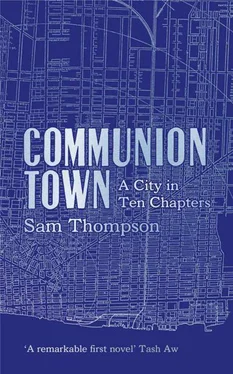‘When I put this to him, Lazarus stared at me for a long time; then he gave me a cold-blooded smile, and I knew that my hypothesis was correct. He had never relinquished the idea of the memory city, despite what he had told Electra. After his disappearance, over the years in which I made my own reputation as a detective and could only wonder what had become of my friend, he had continued the research in secret, his obsession deepening as his expertise grew.
‘“I have accomplished feats of mnemotechnics such as have not been seen for five hundred years,” he told me, with a mixture of complacency and defiance. “I have equalled the greatest of the long-dead artificers of memory.”
‘“And what of the memory city you once imagined, Lazarus? What became of that wild notion?”
‘“Oh, the memory city exists. It exists so completely, so truly, that I wonder sometimes whether anything else exists, anywhere in creation.”
‘“It exists in your mind?”
‘“That is a tame way of expressing the reality, Peregrine. Say instead that my mind is the city. I have done nothing less than reconstruct my consciousness from the sewers to the slates, so that it matches in every detail the form of the city.”
‘My fancy about a doubleness in his gaze grew stronger; his eyes were fixed on my face, but they seemed not to see.
‘“These districts and streets,” he said, “from the fountains and brocaded sentries of the Palace Mile to the drab terraces of Salt Park, from the tower blocks of Sludd’s Liberty to the canal walkways of Thin Gardens, from the acquisitive scrum of Clothmarket to the miniature wilderness of Whitethorn Common, from the desolated industrial estates of Kinsayder Fields to the derricks swinging over Greywater Quays, from the rows of unsold, new-built villas out in Gorgonstown to the introverted ancestral residences of Rosamunda and Lizavet: this is the landscape of my brain.”
‘“But why, Lazarus? What does it mean?”
‘“What does it mean? It means that thoughts are no longer the vague, slippery things they once were. Memories, ideas and plans no longer drift and vanish like smoke, against my will; hopes, fantasies and dreads can no longer betray me. They are laid out in the city of my mind, in the form of houses and bridges, monuments and parks, as clear as a map and as solid as stone. You cannot imagine what richness it is for me to pursue the merest train of thought. I walk the appropriate route through the memory city, and, as I do so, every aspect of the matter I wish to consider unfolds around me: an explosion of instantaneous understanding, manifest in architecture. While the rest of you grope in darkness, a thought for me is space and light.”
‘Warming to the topic, he let me know that, moreover, he had discovered certain efficacious rituals. If he was preoccupied with some especially difficult question, he would make his way through his memory city to the statue of the Flâneur which stands incongruously in that small square off Grin Lane, behind the Strangers’ Market, and would whisper his query into its ear. Then, he had only to wait and watch for how the memory city would reveal its answer: perhaps there would be a traffic accident at False Cross or a slow shipwreck of a sunset over Cento Hill, or perhaps a leaf would fall from a tree in the Autumn Park and brush his shoulder. Whatever it was, Lazarus would read the sign and know what his city was telling him.
‘“When I sleep,” he said, “in my dreams I walk only in the city’s streets. There is nowhere else left.”
‘I knew that some of the more febrile memory-artists of ancient times had supposed that, if one could construct a perfect mental representation of the universe, sculpting the mind into a functional model of the whirling spheres and the mazelike earth at their centre, then by a form of sympathetic magic one would gain power over the universe itself, becoming not much less than a divinity. A mad fantasy, of course — but, if what he said was true, then no one in history had come closer to achieving it than Lazarus Glass.
‘“The memory city gives you the power of insight that you imagined, then,” I said. “But you have twisted it to a purpose far from what you first intended.”
‘“Oh yes,” said Lazarus. “I was an ignorant youth in those days, and could envisage no greater use for the memory city than aiding a detective’s chores. Indeed, soon after perfecting the system I tested its powers in that manner, by attempting to resolve the case of the Stolen Shadow. It had proved intractable for all the city’s detectives — even for you, Peregrine, if you recall — but a glance into the memory city revealed to me every significant detail of the forgers’ operation, from the location of their workshop in Low Glinder to the nature of the minuscule flaws that betrayed their creations as counterfeit. I saw, also, the fault lines of envy and mistrust among the criminals. Rather than report them to the authorities, I sent an anonymous note, a few words long and apparently quite innocuous, to one peripheral gang member, and watched as the repercussions of this intervention caused the entire scam to collapse in on itself. There was satisfaction in that.”
‘But, Lazarus explained to me, the capacities of the memory city went much further. Soon he found that he could manipulate events in the real city with impossible reach and prescience, so instinctively did he know its workings: and no sooner had he realised the extent of his powers than he was beguiled by their potential for evil.
‘“Spread before me,” he said, “I saw all the offices and infrastructures of the city — bureaucracy, politicians, lawyers, police, industry, financiers, unions, news media, utility companies, organised criminals, all of it — no more difficult to control than my own fingertips. The skilled puppeteer needs to give only the slightest twitches on the strings to make his dummies dance. Was it any wonder that I ceased to trouble myself with the constraints of the law?”
‘“No one can wield untrammelled power without paying some price,” I said quietly.
‘“You think so, Peregrine?” said Lazarus. “What an innocent you are. To whom should I pay a price, when nothing exists beyond my thoughts? Who in the city could compel me, when the city is my mind?”
‘Hearing this, I knew what had happened to Lazarus. The city inside his head had fused with the city outside until they were indistinguishable. He could close his eyes and visit his memory city, but when he opened them again, what was the difference? Even when he walked the streets in actuality, he moved in the sealed world of his own thoughts.
‘“My poor friend,” I said, “I am sorry. You are quite insane.”
‘“You understand nothing,” he replied. “True, I have gone beyond the flimsy pretence you call sanity, with its timid distinctions between what is real and what is imaginary. But never mistake me for some sad solipsist, locked up in my own skull. I am precisely the opposite: my mind is so distributed across the city that, for me, there is no difference between a thought and an action. Everything I do — murder and larceny, acquiring the building contract for the tramline, visiting you today, laying my hand on your mantelpiece like this — everything I do is a symbol soaked in significance, an adjustment to the pattern of the memory city.”
‘“Then this is why you wished to influence the development of the metro line?”
‘Anger showed in Lazarus’s eye.
‘“Do you still fail to comprehend me when I tell you that the city and my mind are one and the same? If Thorne had not obstructed me, then by exerting direct control over the creation of a new part of the infrastructure I could have opened who knows what fresh conceptual possibilities.
Читать дальше
Конец ознакомительного отрывка
Купить книгу












